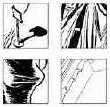
Funny Business
A Special Edition of The East Village
Introduction
The "comic" in literature strikes us as being a misunderstood quantity. Of course, poetry might not be everyone's idea of literature, so let's strike that word, literature, and say comic poetry is misunderstood, in quality and as quantity. Misunderstood, that is, by both supporters and those who would dismiss it out of hand as wooly or inferior (i.e., not "serious" enough). So when you say I've got a funny poem up my sleeve, everything unravels. This situation is not helped by the irony that comedy in popular culture is a mode of entertainment with its own genres: stand-up comedy, the situation comedy, etc. Though comic entertainment and art coexist (c.f. Aristophanes, Shakespeare, Chaplin), when we come to comic poetry -- which is the focus of this issue -- we hit upon the unresolvable problem of trying to reconcile a mode of popular entertainment with a resolutely unpopular, wholly marginalized (but nevertheless thriving) genre. "Art" aside, there is the more unresolvable, more snobbish, and certainly more inversely-commercial factor which we won't go into here, other than to say, this is a collection of crafty stuff whose surname is BUSINESS. Fortunately, the "funny" problem, then, isn't really unresolvable (see examples). The real "problem," as you may have guessed, is partly semantic -- implicating as it does the different ways we have of talking, writing and thinking about the poetic and the comic, not to mention the social and institutional contexts which reinforce those funny differences. If this problem has implications for the critical reception of any poetry which can be taken as "comic," then there is another problem which has implications for our ability to read or write comic poetry. This problem can be put in the form of a question: How does the comic function in poetry (or how does it function differently in poetry than, say, in popular media)? That's two questions, but our contention is that some supposedly humorous poetry (you'll find none of that here) isn't very amusing, while some poems that wouldn't conventionally be thought of as humorous (such as most everything that we've included) are much more so. Ok, we'll make that every last poem included here. Damn. Did you ever wonder why humorous poetry in modern times, our times, has often been confined to the rubric of "light verse"? We just detest rubrics like light or verse or, more, we wouldn't be caught fraternizing with such an aging middlebrow hulk as the token light verse implies. This unfortunate monicker suggests a poetic that's neither meaty nor muscular: hardly the sort of body type that either of the present editors would be inclined to recommend. More recently, another loser category of humorous poem has developed that seems to be modeled on the genre of stand-up comedy. YUCK. This seems at first like a "natural" development, given that lyric poetry is often conventionalized as the seamless utterance of a lone speaker (the oft-criticized "I" of the lyric poem). What is decentering, hegemonic and very, very bogus about this type of humorous poem is that it is reduced to set up and delivery of what is, literally, the punch line. The PARAMETERS of such a writing are noticeably less (and sometimes fewer) than the poetic arts which either of the present editors would be inclined to recommend, partly because such writing depends often upon narrowly ascribed semantics for its effectiveness, ceding in effect much of the apparatus of its craft and becoming, as a result, generically indistinguishable from the well-written joke. In poetry circles the knee-slapping one-liner is a game called NOT ENOUGH. In general, therefore, if the present editors agree on anything, it's that work without play doesn't 'mix,' that every line, at least, 'packs' a punch, and that the comic poem must 'be' no less astonishing than the supposedly serious. Serious, unserious, you may ask, is anything central? Indeed, if anything, the unserious must be less paraphrasable, we aver, and the serious more so. Now we would like at this point to suggest several different classes or "modalities" of poetic hilarity, as a way of expounding what we mean as well as contextualizing the work that you will find in this issue. There are funny poems here. There are extremely silly poems too. And then there are pure platinum, the bold, Laputan, unspeakably stupid poems we won't single out because the others might seem less fun. Further, every poem in Volume Eleven of The East Village is written in shorthand for the ineffable, which is really cool. Funny Business is a 'young lady returned to her quarters' who 'sticks it right in,' a 'ludicrous decoration,' mere 'chip cheer,' and 'skeeters and other booboo buggings.' Here's 'pseudopod' comedy that 'carries your bag down the center of the street' as you 'swill it while watching the telly.' Meantime, there's the 'quest for the separation of goo and grease' as 'streets go east.' 'The mandrills stare.' Etc. -- The Editors
Volume Eleven Index